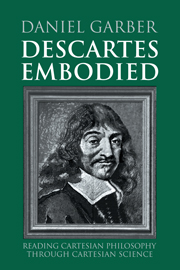Book contents
- Frontmatter
- Contents
- Acknowledgments
- Abbreviations, Citations, and Translations
- Introduction
- Part I Historiographical Preliminaries
- Part II Method, Order, and Certainty
- Part III Mind, Body, and the Laws of Nature
- 7 Mind, Body, and the Laws of Nature in Descartes and Leibniz
- 8 Understanding Interaction: What Descartes Should Have Told Elisabeth
- 9 How God Causes Motion: Descartes, Divine Sustenance, and Occasionalism
- 10 Descartes and Occasionalism
- 11 Semel in vita: The Scientific Background to Descartes' Meditations
- 12 Forms and Qualities in the Sixth Replies
- Part IV Larger Visions
- Sources
- Index
7 - Mind, Body, and the Laws of Nature in Descartes and Leibniz
Published online by Cambridge University Press: 10 November 2009
- Frontmatter
- Contents
- Acknowledgments
- Abbreviations, Citations, and Translations
- Introduction
- Part I Historiographical Preliminaries
- Part II Method, Order, and Certainty
- Part III Mind, Body, and the Laws of Nature
- 7 Mind, Body, and the Laws of Nature in Descartes and Leibniz
- 8 Understanding Interaction: What Descartes Should Have Told Elisabeth
- 9 How God Causes Motion: Descartes, Divine Sustenance, and Occasionalism
- 10 Descartes and Occasionalism
- 11 Semel in vita: The Scientific Background to Descartes' Meditations
- 12 Forms and Qualities in the Sixth Replies
- Part IV Larger Visions
- Sources
- Index
Summary
One of the central doctrines of Descartes' metaphysics was his division of the created world into two kinds of stuff: mental substance whose essence is thought and material substance whose essence is extension. And one of the central problems that later philosophers had with Descartes' doctrine was understanding how these two domains, the mental and the material, relate to one another. Descartes' solution was to claim that these two domains can causally interact with one another, that bodily states can cause ideas, and that volitions can cause bodily states. But this claim raises a number of serious questions. The most obvious problem arises from the radical distinction that Descartes draws between the two domains and from our difficulty in conceiving how two sorts of things so different could ever interact with one another. As the Princess Elisabeth complained to Descartes, “it is easier for me to concede matter and extension to the mind than [it is for me to concede] the capacity to move a body and to be affected by it to an immaterial thing.” Though the story is complex, it is generally held that this problem led later in the century to the doctrine of occasionalism, in which the causal link between mind and body was held to be not a real efficient cause but an occasional cause. Thus, it was claimed, it is God who causes ideas in minds on the occasion of appropriate events in the material world and events in the material world on the occasion of an appropriate act of will. The causal link between mind and body remains but is reinterpreted as an occasional causal link, a causal link mediated by God.
- Type
- Chapter
- Information
- Descartes EmbodiedReading Cartesian Philosophy through Cartesian Science, pp. 133 - 167Publisher: Cambridge University PressPrint publication year: 2000
- 1
- Cited by



